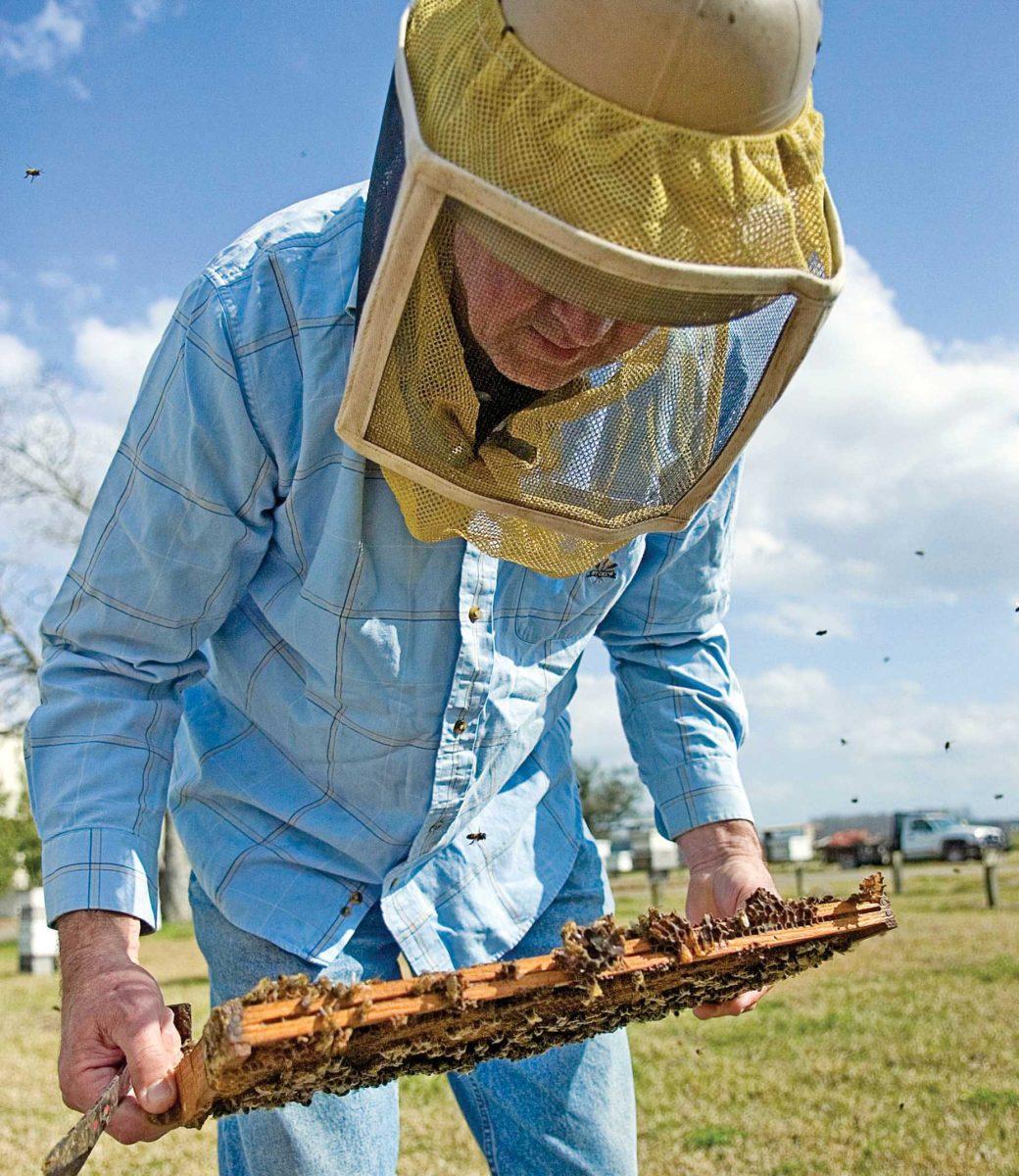Abhorred for their stingers, loved for their production of succulent honey and famous for their work ethic, honeybees throughout the country are increasingly abandoning ship.Data from the U.S. Department of Agriculture indicates beekeepers began reporting the inexplicable loss of as much as 90 percent of their honeybee hives in the fall 2006. This is a national problem that could provide a valuable opportunity for Louisiana beekeepers, said Tom Rinderer, research leader at the Honey Bee Breeding, Genetics and Physiology Research Laboratory.The phenomenon known as Colony Collapse Disorder is marked by the failure of honeybees to return to their hives. Hives that suffer from CCD are often left with little-to-no mature honeybees and without a live queen.”No Louisiana beekeeper has detected anything like CCD,” Rinderer said. “It makes our bees more valuable as other beekeepers in other areas have troubles and don’t have as many bees for direct pollination. Since Louisiana does have good, strong bee stocks, it provides an opportunity for Louisiana beekeepers.”CCD is commonly found in honeybees that are commercially rented to pollinate crops throughout the country. In the year-round enterprise of commercial pollination, massive semi trucks are filled with millions of bees and shipped to pollinate crops. Rinderer said the pressure to perform beyond their typical spring pollination and the stress of being shipped throughout the country as causes for CCD.For shipping, entire colonies — typically comprised of 30,000 to 60,000 bees — are put on pallets in groups of four to six. Between 400 and 500 colonies are loaded onto a truck.This year’s average payout for renting bees to pollinate crops of almonds is about $140 per colony, Rinderer said. With shipping costs of about $12,000, profits are equal to about $60,000 per shipment.”The bees in Louisiana — for the most part — don’t participate in this big movement of bees on trucks to go pollinate,” Rinderer said. “Even our beekeepers that do go to [pollinate crops] don’t have particular problems because they come back to Louisiana.”Bees in Louisiana are typically kept in areas where they have access to a wide variety of food. This enables them to have a balanced diet, Rinderer said. Nationally, bees often only have access to a monoculture diet — the opportunity to feed on only one crop.”The bee industry is a major industry,” said Mike Strain, commissioner of Louisiana agriculture and forestry. “We estimate 40 to 60 percent of the honeybees [nationally] have been lost due to this disorder.”A large portion of honeybees in Louisiana are raised for commercial business, Strain said. Michael Catania, Louisiana beekeeper, said honeybees are vital to the nation for their pollinating abilities.”Just about everything that you put in your mouth, bees are in one way or another directly involved in it,” Catania said. “They’re very important to agriculture.”James Henderson, owner of Golden Delight Honey, said honeybees are responsible for pollinating almonds, blueberries, strawberries and melons. The use of honeybees for crop pollination helps farmers ensure their crops are pollinated while neighboring crops remain untouched, Henderson said. “It’s just like putting them in front of a buffet,” Henderson said of releasing a shipment of honey bees before an untouched crop. “Honeybees will [only] forge out maybe a mile and half from the colony [in search of nourishment].”As soon as temperatures rise above 55 degrees, honeybees that aren’t being rented for commercial crop pollination typically start storing surplus honey, Henderson said. Henderson said plants typically bloom year round in Louisiana. This enables the honeybees to leave the hive in search of pollen, nectar and water. Henderson, who said he typically gets stung no more than 10 times each time he works with his bees, recommended people met with a hive of bees call a beekeeper to have them removed from trees or walls. He recommended those who come into contact with bees in the wild ignore them.”At home, I might have up to six colonies in my backyard,” Henderson said. “I can sit down right next to the colony, and I don’t get stung.”—-Contact Lindsey Meaux at lmeaux@lsureveille.com
Expert: Value of La. bees may increase
March 5, 2009




